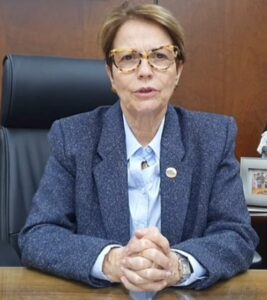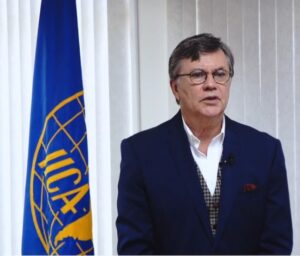This morning, 06/15, the Forum for the Future Institute promoted the opening of the “International Symposium on Scientific Challenges in the New World Food Pact”, within the scope of the Tropical Biomes project. Until tomorrow, the event brings together Brazilian and international authorities in the sciences related to the tropical bioeconomy.

Forum Chair for the Future and former Agriculture Minister Alison Paulinelli
During the opening, Forum Chair for the Future Institute and former Minister of Agriculture, Alison Paolinelli, highlighted that the coming decades will probably be the most challenging in history, with the number of hungry people growing and the population moving toward achieving the more than 10 billion people mark in 2050.
“In this context, we will present during the symposium an active collaborative scientific network, with Brazilian and international research institutes and universities, as well as the participation of the World Bank, the Food and Agriculture Organization and the Bank of Africa, to show that it is possible to further double food production in Brazil, up to 2050, without bring about new deforestation. And that the Amazon can become the world’s largest food basket of natural products without having to cut down a single tree,” said Paulinelli.
For Evaldo Villella, CNPq President and Scientific Coordinator of the Forum of the Institute for the Future, scientific and technological development projects should focus on current or future real challenges or problems, local or global, with access to humanity, that require new, applied, theoretical or empirical knowledge based on Solid science.

Minister of Agriculture, Livestock and Supply Teresa Cristina
“We will broaden this debate in academia and business, along with the actors involved in making the potential of the bio-economy viable. The involvement of government actors in furthering these discussions is also important, always with the aim of working on the potential of transformations in the full sense of sustainable development, with economic progress and social and environmental,” Vilila emphasized.
“No one doubts that Brazil is already an agro-ecological powerhouse. Now we need to know how we can take advantage of all this for the next 30 years. The Minister of Agriculture, Livestock and Supply, Teresa Cristina Correia da Costa Dias, commented at this seminar.
International Support

President of the Inter-American Institute for Cooperation in Agriculture (ICAA), Manuel Otero
The President of the Inter-American Institute for Cooperation in Agriculture (ICAA), Manuel Otero, believes that Latin America has everything to ensure food security as well as the environmental sustainability of the planet. But to achieve this goal, he comments that it is necessary to apply intensive cultivation in knowledge, taking advantage of all the advantages offered.
Our continent has 50% of the known biodiversity, and of course we have to use these resources rationally. At the same time, we have to reduce losses and estimate all waste and waste in Latin America and the Caribbean. There is a huge waste of nearly 130 million tons of food annually.”

World Bank Chief Economist for Agriculture in Africa, Diego Arias
The World Bank’s Chief Agricultural Economist for Africa, Diego Arias, comments that the institution aims to support the transformation of the food sector, not only to increase the competitiveness of the sector, but also so that it has a positive impact on the planet. Environment and human health.
It also shows that knowledge is the key to being able to create this new economy and that the basis for this transformation is in tropical economies. “The topic covered in this symposium is very relevant to the context in which the world is going, not only with the pandemic, but also with climate change and nutrition issues associated with food production,” Arias explains.
“Today I work with Africa and there are countries out there that can benefit a lot from this experience and knowledge that already exists. We are talking not only about generation, but also about the transfer of this knowledge in order to develop a sustainable tropical economy,” he concludes.
Tropical Biomes Project
The Tropical Biomes project is coordinated by the Forum of the Institute for the Future, chaired by Professor Alison Paolinelli, and at its core a partnership with institutions such as CNPq, Embrapa, University of São Paulo (ESALQ), Federal Universities of Lavras and Viçosa, Center for Strategic Studies Management, SEBRAE and FGV-Agro, In addition to several regional institutions in each of the biomes studied. The experiment should develop alternatives to integrating science, energy, nature and food, creating synergies between these areas and focusing heavily on sustainable actions.
The design of the Biomas Project began eight years ago and implementation began in mid-2019, at Cerrados Demonstration Pole, in Rio Verde (GO). Work has now begun in the Amazon and Katinga.
Source: advisory

“Wannabe internet buff. Future teen idol. Hardcore zombie guru. Gamer. Avid creator. Entrepreneur. Bacon ninja.”

